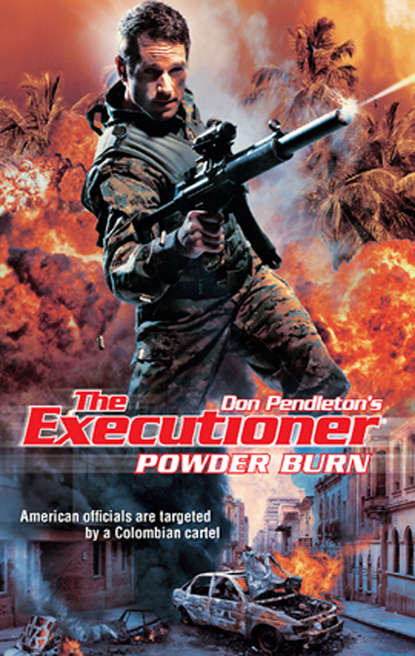По всем вопросам обращайтесь на: info@litportal.ru
(©) 2003-2024.
✖
Powder Burn
Автор
Год написания книги
2019
Настройки чтения
Размер шрифта
Высота строк
Поля
“Which is?”
“We’re only human, too.”
4
“You trust him to deliver, Naldo, after he failed the first time?”
“It was a peculiar circumstance,” Macario replied. “My guess would be that Germán failed to take enough men for the job. Jorge is normally dependable, and he’s aware of what will happen if he fails a second time.”
Esteban Quintaro didn’t seem convinced, but he had not become the cartel’s second in command by challenging Macario. Instead of arguing, he shrugged and said, “No doubt you’re right.”
“The DEA man was eliminated,” Macario said. “That’s something in our favor. It leaves—what, another six or seven in the city?”
“Eight,” Quintaro said. “I have their names and photographs.”
“I’m only interested in the ones who got away.”
“We know the woman,” Quintaro said. “Arcelia Maria Pureza, a lieutenant with the National Police assigned to the narcotics unit. She is thirty-one years old and lives at—”
“Have we tried to buy her, Esteban?”
“On two occasions. She declines our friendship.”
“Foolish pride. Why is she still alive?”
“You never before gave the order to eliminate her, Naldo.”
“You have her home address.”
“I do.”
“Put soldiers on it. If she turns up there, they should attempt to bring her in alive.”
“Alive, Naldo?”
“For questioning. I wish to know the name and the affiliation of her gringo friend.”
“With that in mind,” Quintaro said, “I’ve checked at El Dorado and prepared a list of new arrivals from the States. There were fifteen gringos traveling alone, six more in pairs. Our friend at DAS is gathering a list of their hotels.”
“Check all of them,” Macario replied, knowing before he spoke that the instruction was unnecessary.
And he worried that it might be a wasted effort, too. The stranger, whomever he was, might well be traveling under an alias. There was a fifty-fifty chance that when they learned his name at last, it wouldn’t help.
“While you do that, Esteban,” he continued, “reach out to our friend in Washington.”
“The congressman from—”
“Yes. It’s doubtful he’ll know anything about such matters, but there is a chance—a small one—that he can assist us. The American police kowtow to politicians.”
“And if he can’t help?” Quintaro asked.
“Thank him for trying. Send him a bonus.”
Quintaro’s face revealed his personal opinion of rewarding failure, but he wisely left the words unspoken. “As you wish, Naldo,” he said.
“What’s your opinion, then? About our man of mystery,” Macario inquired.
The question seemed to take Quintaro by surprise. In truth, Macario seldom sought his lieutenant’s opinion. He preferred to give orders and leave Quintaro to carry them out. On this occasion, though, he tried a different tack.
“He won’t be DEA,” Quintaro said.
“Why not?”
“If he’d been sent from Washington, officially, he would have met them at the U.S. Embassy, not in the Pink Zone. He’s avoiding contact with the diplomats.”
“Which tells us…what?”
“He’s unofficial, operating off the books. Perhaps the CIA?”
“They aren’t involved in drug investigations,” Macario said.
“As far as we know,” Quintaro replied. “Under the so-called war on terror, who can say?”
The man had a point. Macario’s attacks on various American officials, culminating with the massacre at the Palace of Justice, could be enough to put the CIA on his trail. Which would mean what, exactly?
In the old days, before Macario was born, the CIA had schemed to eliminate various targets. They’d failed repeatedly with Castro but had scored with Che Guevara in Bolivia, Allende in Chile, plus others in Africa and Asia. Such “executive actions” were forbidden these days, at least on paper, but Macario understood that reality often deviated from public policy.
“I want the gringo, Esteban,” he said. “Make it your top priority.”
“Sí, Jefe.”
“When you find the woman, he should be nearby. If not, she’ll know how to reach him. See to it that she tells you.”
“And if she resists, Naldo?”
“Subdue her. Use whatever force is necessary, but she must be fit for questioning.”
“I’ll speak to our doctor and have him standing by.”
“Good thinking.”
The doctor was a third-generation Nazi whose grandfather had avoided prosecution for war crimes by fleeing to South America, sampling the hospitality of Argentina’s Perón and Paraguay’s Stroessner before settling in Colombia under the Rojas regime. He had advised the army on interrogation methods, and supplied that same expertise to paying clients in the private sector.
Viva free enterprise!
“I won’t detain you any longer from the hunt,” Macario announced. “Keep me updated on your progress, eh?”
“Of course, Naldo.”











